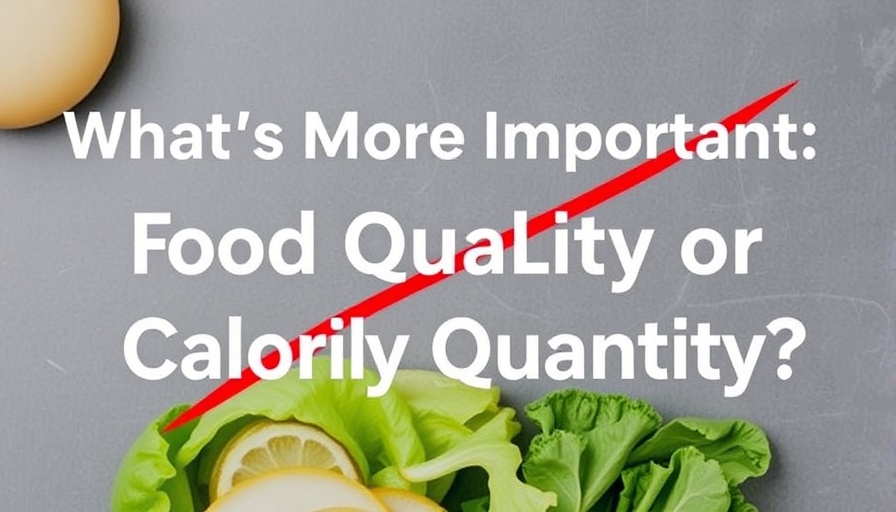
Understanding the Balance: Food Quality vs. Calorie Quantity
When navigating the ever-confounding realm of nutrition, it’s easy to feel torn between two primary ideas: the importance of calorie quantity and the need for food quality. As many face the dilemma of choosing a low-calorie option over a more nutritious one, the complexity of making healthy choices unfolds. Adults aspiring for a healthy lifestyle must recognize that both calorie counting and food quality are essential to improving health and attaining personal fitness goals.
Calories Matter – But Are They Everything?
The foundational understanding in weight management states: consume more calories than your body burns, and weight gain is likely; consume fewer, and weight loss is probable. Yet, this perspective is insufficient. Dietitian Daisy Mercer emphasizes that focusing solely on calories can lead to cycles of hunger, cravings, and ultimately overeating. It’s not merely about restricting calorie intake – it’s also about nourishing the body effectively. Consuming high-quality foods, such as whole grains, vegetables, and healthy fats, can satisfy hunger better and help individuals avoid unnecessary snacking.
Why Food Quality Shouldn’t Be Ignored
Food quality refers to the nutrient density and the processing of available food options. High-quality foods are unrefined and full of beneficial nutrients. These include whole foods such as fruits, vegetables, nuts, and lean meats. In contrast, lower-quality foods, such as sugary drinks and fried snacks, are often stripped of these nutrients and can lead to hunger quite quickly after consumption. Consuming nutrient-poor, calorie-rich foods could potentially sabotage weight loss efforts, making it harder to manage calories in the long run.
The Importance of Nutrient-Dense Foods
Nutrient-dense foods pack a higher punch of vitamins and minerals in lower calorie amounts, which is especially vital for older adults who may require fewer calories but more nutrients as suggested by the National Institute on Aging. By integrating foods like leafy greens, beans, and fortified grains into diets, individuals can stay satisfied without overshooting their caloric goals.
How to Effectively Navigate Your Food Choices
Navigating what to eat can feel overwhelming, but actionable insights can help simplify healthier choices. Integrating a variety of colorful fruits and vegetables not only enhances the diet’s aesthetic appeal but also ensures a richer nutrient profile. Portion control is also crucial; understanding serving sizes can prevent inadvertently overconsuming. Furthermore, swapping overly processed foods with whole foods yields greater satisfaction and energy levels, leading naturally to fewer overall calories consumed.
Beyond Calories: Mental and Cognitive Benefits
Choosing quality over quantity can extend benefits beyond weight management. Nutrient-rich foods can enhance mental clarity and cognitive function. Foods rich in healthy fats, like fish and nuts, serve as natural brain boosters, contributing not only to physical health but also improving mental energy. Incorporating energy-boosting foods—alongside considerations for calorie quality—can result in sustained energy levels throughout the day.
Future Predictions: A Shift Toward Food Quality
As health awareness continues to grow, we are likely to see an ongoing shift where food quality takes precedence in public discourse about health and nutrition. Encouraging policy changes towards better food labeling, promoting whole foods in schools and communities, and increasing accessibility to fresh produce are vital to supporting healthier lifestyles across demographics. Individuals adopting a holistic view of diet, focusing equally on caloric intake and nutritional quality, will undoubtedly lead the way.
Making Informed Decisions with Smart Choices
The path to better health does not stem from rigid calorie counting alone but rather from the intelligent combination of mindful eating practices. Understanding the significance of both food quality and calorie quantity can empower individuals, making it easier to attain and maintain a healthy lifestyle.
For those invested in living a healthier life, the choice should not merely be about how many calories to eat but rather, about what types of foods contribute positively to one’s overall well-being. By engaging in intentional food choices and considering the nutritional density of meals, you will likely find a stylish intersection of flavor and nourishment that elevates your meals.
 Add Row
Add Row  Add
Add 


Write A Comment